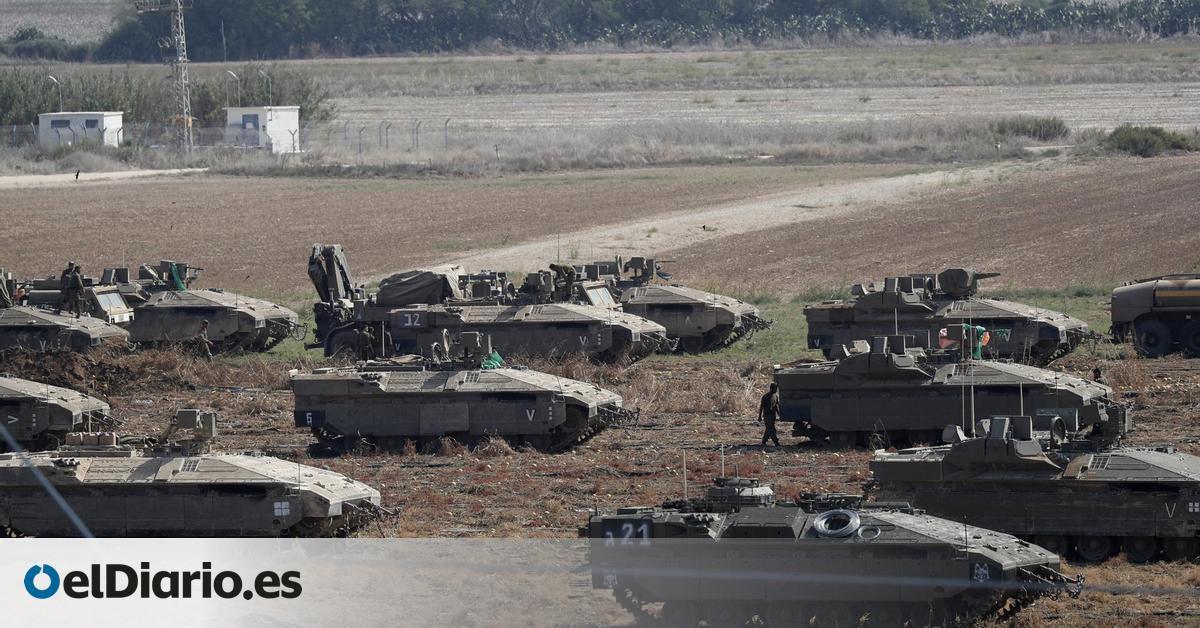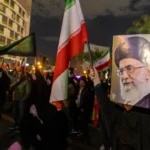
After the expiration of Israel’s ultimatum, when tens of thousands of civilians have been trapped in northern Gaza or resisting in the south of the territory under constant bombardment and with hardly any drinking water or basic food, Israeli troops are accumulating on the border with the Strip awaiting the final order to begin the feared land incursion. “The next phase is near,” Israeli Prime Minister Benjamin Netanyahu told his military members whom he visited in southern Israel.
“With our fighters in the Gaza Strip, on the front line. We are all ready,” the Israeli leader published on the social network In the images released, Netanyahu, dressed in a military bulletproof vest, greets several soldiers while asking them a question: “Are you ready?”
With our fighters in the Gaza Strip, on the front line. We are all ready.
(Photo: Avi Ohion, L.A.M.) pic.twitter.com/TiGzHcWhPK
— Benjamin Netanyahu (@netanyahu) October 14, 2023
Fears about the imminent invasion of northern Gaza have increased in recent hours. This Friday, Israel ordered the transfer to southern Gaza of the entire population residing north of Wadi Gaza, which was equivalent to approximately 1.1 million people, half of the population of the entire Palestinian territory. At first the deadline was 24 hours, but this Saturday a spokesperson for the Israeli Army has extended the estimated time before the intensification of the offensive in the north of the Strip: 3:00 p.m., one hour later in Israel .
“I would like to inform you that the Israel Defense Forces will allow movement on the indicated streets without any damage between 10:00 a.m. [9.00, hora peninsular española] and 4:00 p.m. [15.00, hora peninsular española]. For your safety, take advantage of the short time to move south, from Beit Hanun to Khan Yunis. If you care about yourself and your loved ones, please head south as instructed,” Israeli Army spokesman Avichay Adraee wrote in Arabic via the social network X, in a message accompanied by a map marking specific roads. .
The specter of a ground incursion into northern Gaza has been hovering over the Palestinian population since this week. “We started the offensive from the air. Later, we will also come from land,” Defense Minister Yoav Gallant told Israeli troops this week near Gaza. Israel has vowed to destroy Hamas after its fighters breached the high-tech fence surrounding the strip and carried out a brutal attack, killing 1,300 people, mainly Israeli civilians, and taking dozens of hostages last weekend. The country has mobilized 360,000 reservists, the most in its history, and has built up long lines of tanks around the border with Gaza, where Hamas has been preparing defenses, including networks of tunnels, for years.
In the hours before the deadline, Israeli troops have prepared at certain points near the border with Gaza, according to an Israeli military spokesman. Several images show dozens of military vehicles deployed around the Strip. “Around the Gaza Strip, Israeli reserve soldiers in training are preparing for the next stage of operations,” Lt. Col. Jonathan Conricus said in a video briefing early Saturday. “They are all over the Gaza Strip, in the south, in the center and in the north, and they are preparing for any target they encounter, whatever the task.”
While thousands of Palestinians fled the northern Gaza Strip on Saturday to avoid an expected ground attack from the neighboring country, the constant bombing continued to hit a population that was faced with the dilemma of abandoning their homes in the north of the territory or moving to the south in an operation described by the United Nations as “simply impossible” and “extremely dangerous” within the deadlines provided by Israel, which has not stopped bombing the Palestinian territory.
Although the Israeli Army assured that it would keep two roads open to let people escape, the Spanish committee of the United Nations Agency for Palestinian Refugees (UNRWA) has denounced the constant attacks suffered in Gaza during the last 24 hours. “The population that is fleeing is suffering the impacts of Israeli bombings. There is not a place on the strip that is not being bombed. The situation is chaotic, they constantly hear the sounds of bombs and they do not dare to leave their homes,” said Raquel Martí, executive director of UNRWA Spain.
According to Hamas, the Israeli army has killed 70 Palestinians and wounded more than 200 in recent hours as they tried to flee Gaza City after warning residents that they had to leave for the southern section of the Strip. The Hamas statement states that women and children were also killed in the attack, adding that this event illustrates “the extent of lies and deceit” by Israeli forces in their call for Palestinians to evacuate so as not to harm innocent Since the beginning of the military escalation, the number of Palestinians killed by Israeli bombings in the Strip has risen to 2,215, including 724 children, according to the Gaza Ministry of Health.
Many residents have not been able to find transportation to travel or are unable to get around because they are elderly, sick, disabled, or fear they have nowhere to go. Without the option of crossing the border into Egypt, a large part of Gaza’s population has been flocking to the south in search of refuge, as supplies of drinking water and basic food run out under the total blockade imposed by Israel on the Palestinian territory.
Following the expiration of the deadline for the questioned mass displacement order, Palestinian Red Crescent volunteers have refused to leave northern Gaza. “Our volunteers refuse to leave and abandon those who need them most,” said one of the top officials of the International Committee of the Red Cross (ICRC) this Saturday.
In recent hours the offensive against Hamas continues on various fronts. The Israeli army has announced that it has killed two leaders of Hamas forces, Murad Abu Murad and Ali Kachi. They also claim to have attacked dozens of Hamas targets throughout the Gaza Strip. According to the IDF, Abu Murad “played an important role in preparing terrorists” for last Saturday’s attack on Israeli communities near the Gaza border. Ali Kachi was also one of the Hamas commanders “who led the attack” that killed 1,400 Israelis last Saturday. against Israeli border communities near Gaza last Saturday. Israel’s armed forces also stated this Saturday that they have confirmed that Hamas is holding more than 120 civilians captive.
Added to this are the tensions raised on Lebanon’s border with Israel. This Saturday, a group of militiamen tried to cross it and Israeli Army soldiers killed several of them, as reported by a military spokesperson to the Efe agency. “Army soldiers identified a terrorist cell that tried to infiltrate Israeli territory from Lebanon. “A drone from the Israeli forces targeted the terrorist cell and killed several of the terrorists,” said the Israeli soldier, without giving a precise number.
The instructions issued by the Israeli authorities for the inhabitants of Gaza City to immediately leave their homes add to the complete siege that leaves them without food, water and electricity in a territory where the humanitarian situation was already very difficult after 16 years of blockade. More than 423,000 people have already had to forcibly leave their homes due to violence in the last week. The Ráfah border crossing – to the south – with Egypt has remained closed to the movement of people and goods.
The blockade has aggravated the humanitarian situation in Gaza in recent hours. UNRWA has warned this Saturday that more than two million people are being left without drinking water due to Israel’s blockage of the entry of humanitarian aid. “It has become a matter of life and death. It is a duty: It is necessary to deliver fuel now to Gaza so that water is available for 2 million people,” UNRWA Commissioner General Philippe Lazzarini warned in a statement. The Gaza Ministry of Health has demanded this Saturday the urgent opening of border crossings to remove the sick and injured, with the aim of them receiving treatment abroad due to the great difficulties in being treated after the power outage linked to Israeli intervention.
Preparing for an expected Israeli incursion into Gaza and a possible attempted mass exodus of the population, Egypt this Saturday began placing cement blocks around the border with Gaza to prevent the entry of displaced Palestinians from the Strip into the crossing, according to Egyptian security sources have informed EFE. “There are additional measures that have been taken, such as the placement of cement blocks to prevent the entry of Palestinians displaced to the south, whose number is estimated at around one million people, to the crossing,” they stated.
As the humanitarian situation worsens, large numbers of displaced people could head to the crossing into Egypt as “the humanitarian situation in the Gaza Strip worsens.”
Many voices have warned that mass displacement in the midst of hostilities like this puts the lives of the sick and wounded in immediate danger. Gaza’s health system is already on the brink of collapse and hospitals in the southern Strip are at capacity. The two Ministry of Health hospitals in northern Gaza that remain operational have far exceeded their combined capacity of 760 beds, with severe overcrowding.
According to the World Health Organization (WHO), which has called for the order to be immediately revoked, vulnerable patients include those who are seriously injured or dependent on assisted breathing. The pressure of the deadline, the complex logistics of transport, damaged roads and, above all, the lack of supportive care during transport, add to the difficulty of moving the sick, says the WHO. The Palestinian Red Crescent has explained that it does not have the means to evacuate the sick and injured from its hospitals, nor the elderly and disabled. “There are no safe areas in the entire Gaza Strip,” he says.
“Moving more than a million people through a densely populated war zone to a place without food, water or shelter, when the entire territory is under siege, is extremely dangerous and, in some cases, simply impossible,” he said. This Friday the Secretary General of the UN, António Guterres, who warned that the situation in Gaza has reached “a new and dangerous minimum.”
The International Committee of the Red Cross (ICRC) assures that the Israeli order is not compatible with international humanitarian law. “When military powers order inhabitants to leave their homes, they must take all possible measures so that the population has access to basic goods, such as food and water, and so that members of the same family are not separated. “, he emphasizes in a statement. “Gaza is a closed area, of limited size and resources. For Gazans, today it is impossible to know which areas will be attacked.”
Source: www.eldiario.es

